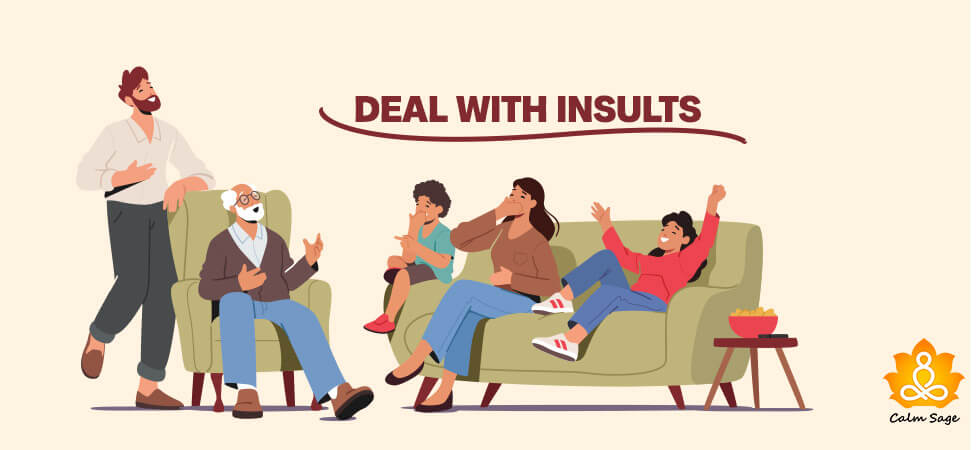The first part is about dealing with insults and putdowns while the second goes deeper into responses.
Part 1 – How to Deal With Insults and Put-Downs by Neel Burton
Insults can be physical, such as punching, slapping, or spitting. More usually, they are verbal, whether direct or indirect. Examples of indirect verbal insults are jokes and ironic comments, backhanded compliments, mimicry, and false fascination. Ocular and facial expressions can substitute for speech; and things like a cold or constant stare, a false or exaggerated smile, or a raised eyebrow can, depending on their intention, also count as indirect verbal insults.
All of the above involve actively doing something, and therefore count as insults of commission. But insults of omission are equally if not more common. Examples of insults of omission are not inviting or including someone, not deferring to her age or rank, and not responding to her friendly gestures, including basic eye contact.
So, what is the best way of dealing with all these insults?
1. Anger.
This is the weakest possible response, and this for three main reasons. First, it shows that we take the insult, and therefore the insulter, seriously. Second, it suggests that there is truth in the insult. And third, it upsets and hurts us—which can invite further insults.
2. Acceptance
This may seem like a very weak response, but in many cases is actually the strongest response of all. When someone insults us, we ought to consider three things: whether the insult is true, who it came from, and why. If the insult is true or largely true, the person it came form is reasonable, and his motive is worthy, then the insult is not an insult but a statement of fact and, what’s more, one that is potentially very helpful to us. Thus, we seldom take offence at our teacher, parent, or best friend.
In general, if you respect the person who insulted you, you ought to give thought to the insult and learn as much as you can from it. On the other hand, if you think that the person who insulted you is unworthy of your consideration, you have no reason to take offence, just as you have no reason to take offence at a naughty child or barking dog. So whatever the case, you have no reason to take offence.
3. Returning the insult
There are several problems with the put-down, even if it is a very clever one. First, it does have to be clever, and, second, it has to occur to us at just the right moment. But even if we are as sharp as Oscar Wilde, a witty put-down is unlikely to be our best defence. The problem with the put-down, however witty it may be, is that it tends to equalize us with our insulter, raising him up to our level and bringing us down to his. This gives him and his insult far too much credibility. The witty put-down should only be used among friends, and only to add to the merriment. And it should be followed by something like a toast or a pat on the shoulder. In other words, it should only ever be used for humour.
4. Humour
Humour is an especially effective response for three reasons: it undermines the insult, it brings the audience (if any) on side, and it diffuses the tension of the situation. Here is an example of the effective use of humour. Cato the Younger, the Roman statesman and stoic philosopher, was pleading a case when his adversary Lentulus spat in his face. After wiping off the spittle, Cato said, ‘I will sweat to anyone, Lentulus, that people are wrong to say that you cannot use your mouth.’
Sometimes, it might even be appropriate to exaggerate or add to the insult so as to make a mockery of the insulter and, by extension, the insult: ‘Ah, if only had known me better, you would have found greater fault still!’
5. Ignoring the insultOne downside of humour is that it requires quick thinking. In contrast, ignoring the insulting is easier and, in fact, more powerful. One day, a boor struck Cato while he was out at the public baths. When the boor realized that it was Cato whom he had struck, he came to apologize. Instead of getting angry or accepting his apology, Cato replied, ‘I don’t remember being struck.’ Subtext: ‘You are so insignificant that I don’t even care to register your apology, let alone take offence at your insult.’
In conclusion, we need never take offence at an insult. Offence exists not in the insult but in our reaction to it, and our reactions are completely within our control. It is unreasonable to expect a boor to be anything but a boor; if we take offence at his bad behaviour, we have only ourselves to blame.
Acknowledgement: The principal ideas and examples in this chapter are from A Guide to the Good Life: The Ancient Art of Stoic Joy by William Irvine.
Amazon #ads

Part 2 – First-Class Responses to Second-Class Putdowns By Linda Sapadin, Ph.D
Wouldn’t it be great if people went out of their way to appreciate what you did right instead of berating you for what you did wrong? Wouldn’t it be fantastic if people nixed their insults, squelched their criticisms and, instead, supported and encouraged you? Before you interrupt my starry-eyed fantasy, let me enjoy my moment of reverie.
Okay, micro-vacation over. Back to reality, where people blame and criticize all the time — and that’s on their good days! On their bad days, they throw in insults, curses, ridicule and humiliation.
When you’re on the receiving end of such put-downs, how should you respond?
Most people are familiar with only three strategies:
– Explain or justify why you did what you did
– Respond offensively by attacking the attacker.
– Say nothing and silently stew.
Such responses frequently result in attacks and counterattacks or passive-aggressive behaviour laced with blame and shame. Thus, it’s a good idea to expand your repertoire of responses. Here are seven ideas for you to try on:
1. Agree with what’s been said. Disagree with the negative value judgment.
“Yes, I agree. My room is a mess. No need to call me names, though. I’ll clean it up this evening. Promise.”
2. Respond to what’s happening (the process), not to what was said(the content).
“I can see you’re upset with me. Can you calmly explain what I did that’s bothering you?”
3. Agree that you did something wrong and apologize.
“Yes, I should have called earlier to cancel. I apologize. I’d like to set another date now if that’s OK with you.”
4. Disagree but try to understand the other person’s viewpoint.
“I didn’t think I did anything wrong but I see you’re upset. Tell me more about what’s upsetting to you so I can understand.”
5. Enlighten the person about your sensitivities.
“I feel demeaned when you use that tone of voice with me. You may think there’s nothing wrong with it, but it feels patronizing to me.”
6. Offer the person another way to phrase what he said.
“I don’t mind if you call me ‘sensitive’ but it feels like a putdown when you say I’m ‘overly sensitive.’
7. Be succinct.
Often, the less you say, the more powerful your message. “The name you just called me is totally unacceptable. I don’t deserve to be treated that way.”
If you believe that you’ve been unfairly put down, your goal should be to respond with valuable, constructive information in a confident, strong tone of voice.
You may also find this post helpful – How to Handle Criticism and Negativity
Keep this note somewhere you will see it regularly e.g. mirror where you brush your teeth, opposite your toilet wall, phone wallpaper –
Amazon #ads

Podcast #390: Why Insults Sting and How to Handle Them
Summary:
– A direct insult is verbal and tell them they’re ugly or similar. Shunning, ignoring. Human brainpower goes into creative insults.
– Indirect insults are when you talk bad about them. Backbiting, spear campaigns, etc.
– Backhanded compliments, etc.
– We’re programmed to get accepted and be loved as a way of survival.
– Ambush insult e.g. I picked up your book and couldn’t stop laughing, I laughed so hard. Some day I plan to actually read it. They talk about insults with style and examples can be found at When Insults Had Class
– Partners would do it a lot with each other. There is a fine line from teasing though and can also turn into bullying. Sometimes you can say with the best intentions but some people can be very sensitive. It’s a fragile ego (Paras note: It’s also something I noticed people from Toxic Families or Traumatic Childhoods face as they need to be sensitive to avoid the harmful behaviours.)
– There is a difference with the PC culture and everyone being offended these days. Black was bad so then it was Afro-American, then it was African-American, now it’s person of colour… what next.
– If someone calls you bad names or accuses you think of them as bad as an ignorant dog barking at you.
– Help sensitive people with a healthy sense of self. It’ll help how they respond in all situations.
– Micro-aggressions emerged so when you say hey guys to a group with a woman in it you’re guilty.
– If people say something critical of you they can get mentor status as they will shine a light on things that will help you.
– Praise can be insulting e.g. that makes you look thinner. Sarcastic praise is another one.
– When someone insults us, we should turn a blind eye.
– Even better insult yourself even further.
– Become a praise pacifist because when someone praises you and you brush it off you will not be an insult pacifist only but also other peoples opinions will not move you.
– Think about why you insult, it could be envy, hateration, etc. There is something deeper to it.
– As a stoic, the author tries to help other people and a quick way is to let someone who is hurting know that the person insulting is an idiot.
Amazon #ads





